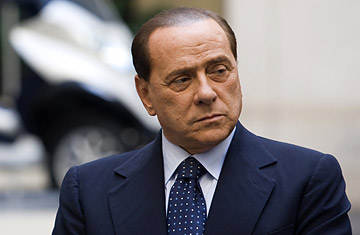
Italian Prime Minister Silvio Berlusconi
"Is there anyone who has any questions about underage females?" Not the typical way for the leader of a G-8 nation to begin a formal news conference. But this is Italy in the age of Silvio Berlusconi, the land of a flamboyant billionaire Prime Minister whose ambiguous relationship with an 18-year-old aspiring showgirl has dominated public debate for most of the month of May. Welcome to springtime in Berlusconistan.
The Prime Minister rules over this reality-show republic by virtue of his political persistence and surprising popularity (this is his third term), with his control of the airwaves (he owns the three main private TV channels) and, perhaps most intriguingly, with his ability to transform his personal whims into a disturbingly entertaining public discourse in a democracy of 58 million people. But his critics — and they do manage to get airtime in Berlusconistan — believe that the 72-year-old master manipulator may have triggered a news cycle that could actually lead to his political demise. (See Berlusconi's worst gaffes.)
First, his furious wife Veronica Lario accused him of frequenting "underage females," specifically a leggy blonde from Naples named Noemi Letizia, after local papers revealed last month that Berlusconi had attended the girl's 18th birthday party and showered her with expensive gifts. Two days after the aggrieved spouse made the charge, she asked for a divorce. The Prime Minister stated publicly that he'd known Letizia only through her parents, and the father declared his daughter "chaste," saying Berlusconi was an acquaintance he had made through local politicians. But the center-left daily La Repubblica and opposition leader Dario Franceschini have hammered away at inconsistencies in the Prime Minister's account of his relationship with the family. Then on Thursday, Berlusconi broke a long silence about the nature of his relationship with the teenager. (Check out an essay by Beppe Servergnini on Berlusconi.)
Amid the nervous laughter of his aides and reporters, Berlusconi, a Cheshire-cat grin widening across his face, brought up the question himself about le minorenni following the weekly meeting of the Council of Ministers in Rome. No, he insisted, there was nothing piccante (spicy) or "more than piccante" in his encounters with anyone underage, and he'd sworn so on the heads of his own children. Berlusconi insisted that he would have "resigned immediately" if he had been guilty of any of the aforementioned spiciness with someone under the age of consent. That, he said, was all he would say on the matter. Which only kicked up more controversy.
Some journalists say this could be the Berlusconi equivalent of Bill Clinton's "I did not have sexual relations with that woman" moment — a fact-checking challenge to investigators throughout Berlusconistan and a spur to even more debate and speculation about the Prime Minister's private life. But at the same time, the potential for scandal just might help Berlusconi keep his popularity high by giving him center stage in a public arena that ever more resembles The Jerry Springer Show (or a Fellini film).
Berlusconismo is the term used by those attempting to understand the phenomenon of how a man with an emperor's instincts and appetites is also the longest-serving democratic leader in the West. He uses international diplomacy to practice his best and worst one-liners; he flaunts his wealth and insults the many magistrates who persistently investigate his business dealings; and, as of late, he has boasted of his Casanova charms, publicly swooning over a former showgirl turned politician, Mara Carfagna, whom he appointed his Minister of Equal Opportunity last year. (His trusted ally Umberto Bossi referred this week to Berlusconi's reputed use of Viagra.)
Whenever Berlusconi reaches a new high — or low — I make a point of checking with veteran La Repubblica columnist Filippo Ceccarelli. "Even if you think he's a scoundrel," says Ceccarelli, "a scoundrel creates attraction, popularity. There's a reason people go to see movies about figures like him. When the electorate is really just an audience, he continues to be No. 1."
See the world's most influential people in the 2009 TIME 100.
